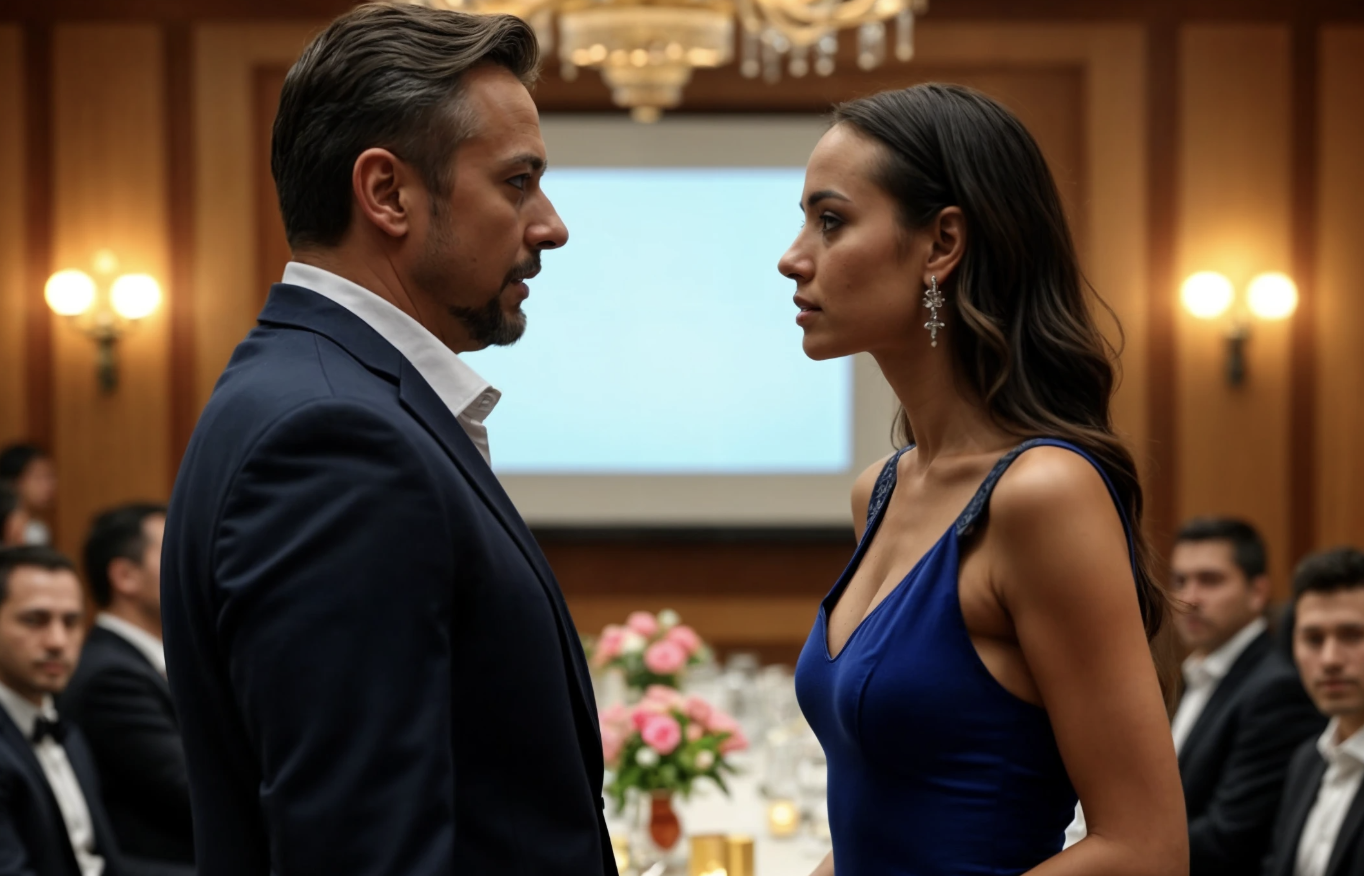The mirror in the bedroom reflected a familiar scene: I was smoothing the folds of a modest gray dress I had bought three years ago at an ordinary store. Dmitry stood nearby, fastening the cufflinks on his snow-white shirt—Italian, as he never tired of emphasizing at every opportunity.
“Are you ready?” he asked, not looking my way, intently brushing off imaginary dust from his suit.
“Yes, we can go,” I replied, checking one last time that my hair was neatly arranged.
He finally turned to me, and I saw in his eyes that familiar look of slight disappointment. Dmitry silently appraised me from head to toe, lingering on the dress.
“Don’t you have anything more decent?” he said with the usual tone of condescension.
I heard these words before every corporate event. Each time they hurt like a prick—a sting, not deadly, but unpleasant. I had learned not to show how much it hurt. I learned to smile and shrug.
“This dress is quite appropriate,” I said calmly.
Dmitry sighed as if I had let him down again.
“All right, let’s go. Just try not to stand out too much, okay?”
We got married five years ago when I had just graduated from the economics faculty, and he was working as a junior manager at a trading company. Back then, he seemed to me an ambitious, goal-oriented young man with bright prospects. I liked how he talked about his plans, how confidently he looked to the future.
Over the years, Dmitry really climbed the career ladder. Now he is a senior sales manager handling major clients. The money he earned went to his appearance: expensive suits, Swiss watches, a new car every two years. “Image is everything,” he liked to say. “People must see that you are successful, or they won’t deal with you.”
I worked as an economist in a small consulting firm, earned a modest salary, and tried not to burden the family budget with excessive expenses for myself. When Dmitry took me to corporate events, I always felt out of place. He introduced me to colleagues with a slight irony: “Here I am, bringing out my little gray mouse.” Everyone laughed, and I smiled, pretending I found it funny too.
Gradually, I began to notice how my husband had changed. Success went to his head. He began looking down not only on me but also on his employers. “I’m peddling this junk made by our Chinese guys to these suckers,” he said at home, sipping expensive whiskey. “The main thing is to present the product right, and they’ll buy anything.”
Sometimes he hinted at some additional sources of income. “Clients appreciate good service,” he winked. “And are willing to pay extra for it. Personally to me, you know?”
I understood, but preferred not to delve into details.
Everything changed three months ago when a notary called me.
“Anna Sergeyevna? This concerns the inheritance of your father, Sergey Mikhailovich Volkov.”
My heart skipped a beat. Father left our family when I was seven. Mom never told me what happened to him. I only knew that he worked somewhere, lived his life, which had no place for a daughter.
“Your father passed away a month ago,” the notary continued. “According to the will, you are the sole heir to all his property.”
What I learned at the notary’s office turned my world upside down. It turned out father was not just a successful businessman—he had built an entire empire. An apartment in central Moscow, a country house, cars, but most importantly—a private investment fund owning shares in dozens of companies.
Among the documents, I found a name that made me shudder: “TradeInvest”—the company where Dmitry worked.
For the first weeks, I was in shock. Every morning I woke up and couldn’t believe this was real. I only told my husband that I had changed jobs—now working in investment. He reacted indifferently, just muttering something about hoping my salary wouldn’t be less than before.
I began to study the fund’s affairs. My economics education helped a lot, but more importantly—I found it genuinely interesting. For the first time in my life, I felt I was doing something important, something that really mattered.
I was especially interested in the company “TradeInvest.” I requested a meeting with the CEO, Mikhail Petrovich Kuznetsov.
“Anna Sergeyevna,” he said when we were alone in his office, “I must be honest: the company is not doing very well. Especially problems in the sales department.”
“Tell me more.”
“We have one employee, Dmitry Andreyev. Formally, he manages major clients, turnover is high, but profits are almost zero. Moreover, many deals are unprofitable. There are suspicions of violations, but insufficient evidence so far.”
I asked for an internal investigation, without revealing the true reason for my interest in this particular employee.
The investigation results came a month later. Dmitry was indeed embezzling company funds by arranging “personal bonuses” with clients for discounted prices. The amount was substantial.
During this time, I managed to update my wardrobe. But true to myself, I chose understated clothes—only now they were from the best designers in the world. Dmitry didn’t notice the difference. For him, anything that didn’t shout about the price remained “mouse-gray.”
Last night, he announced they had an important corporate event tomorrow.
“A reporting dinner for top management and key employees,” he said importantly. “The entire company leadership will be there.”
“I see,” I answered. “What time should I be ready?”
Dmitry looked at me with surprise.
“I won’t take you there; there will be decent people, not your level,” he said, unaware that I owned the company he worked for. “You understand, it’s a serious event. People who decide my fate in the company will be there. I can’t afford to look… well, you know.”
“Not really.”
“Anechka,” he tried to soften his tone, “you are a wonderful wife, but you lower my social status. Next to you, I look poorer than I really am. These people need to see me as their equal.”
His words hurt, but not as sharply as before. Now I knew my worth. And I knew his.
“All right,” I said calmly. “Have fun.”
This morning Dmitry left for work in high spirits. I put on a new Dior dress—dark blue, elegant, which emphasized my figure but remained restrained. Did professional makeup and hair. Looking in the mirror, I saw a completely different person. Confident, beautiful, successful.
I knew the restaurant where the event was held—it was one of the best in the city. Mikhail Petrovich met me at the entrance.
“Anna Sergeyevna, glad to see you. You look wonderful.”
“Thank you. I hope today we can summarize and outline plans for the future.”
The hall was full of people in expensive suits and dresses. The atmosphere was businesslike but welcoming. I talked with heads of other departments, met key employees. Many knew me as the new company owner, although it was not yet public information.
I noticed Dmitry as soon as he entered. He was in his best suit, with a new haircut, looking confident and important. He scanned the room, clearly evaluating the attendees and his place among them.
Our eyes met. At first, he didn’t understand what he was seeing. Then his face twisted in anger. He decisively approached me.
“What are you doing here?” he hissed, getting close. “I told you this is not for you!”
“Good evening, Dima,” I replied calmly.
“Get out of here immediately! You’re embarrassing me!” He spoke quietly but fiercely. “And what’s with the masquerade? Wearing your mouse rags again to humiliate me?”
Several people began to look our way. Dmitry noticed and tried to compose himself.
“Listen,” he said in a different tone, “don’t make a scene. Just leave quietly, and we’ll discuss everything at home.”
At that moment, Mikhail Petrovich approached us.
“Dmitry, I see you have already met Anna Sergeyevna,” he said with a smile.
“Mikhail Petrovich,” Dmitry immediately switched to obsequious mode, “I didn’t invite my wife. Honestly, she’d better go home. This is a business event…”
“Dmitry,” Mikhail Petrovich looked at him in surprise, “but I invited Anna Sergeyevna. And she’s not going anywhere. As the company owner, she must attend this reporting event.”
I watched as the information reached my husband’s mind. First confusion, then realization, then horror. The color slowly drained from his face.
“The owner… of the company?” he repeated barely audibly.
“Anna Sergeyevna inherited a controlling stake from her father,” Mikhail Petrovich explained. “She is now our major shareholder.”
Dmitry looked at me as if seeing me for the first time. I read panic in his eyes. He understood that if I knew about his schemes, his career was over.
“Anya…” he began, and his voice carried notes I had never heard before. Pleading. Fear. “Anya, we need to talk.”
“Of course,” I agreed. “But first, let’s listen to the reports. That’s why we are here.”
The next two hours were torture for Dmitry. He sat next to me at the table, tried to eat, to keep up conversation, but I saw how nervous he was. His hands trembled when he raised his glass.
After the official part, he pulled me aside.
“Anya, listen to me,” he spoke quickly, ingratiatingly. “I understand you probably know… or maybe someone told you… But it’s all not true! Or not quite true! I can explain everything!”
That pathetic, humiliated tone was even more repulsive to me than his previous arrogance. At least back then he was honest in his contempt for me.
“Dima,” I said quietly, “you have a chance to leave the company and my life quietly and gracefully. Think about it.”
But instead of accepting the offer, he exploded:
“What game are you playing?!” he shouted, ignoring the fact people were watching us. “You think you can prove something? You have nothing on me! It’s all nonsense!”
Mikhail Petrovich gestured to security.
“Dmitry, you are disturbing order,” he said sternly. “Please leave the premises.”
“Anya!” Dmitry shouted as they escorted him out. “You’ll regret this! Hear me?!”
At home, a real scandal awaited me.
“What was that?!” he yelled. “What the hell were you doing there? Trying to set me up? Think I don’t know what this is—a performance?!”
He paced the room, waving his arms, his face red with rage.
“You won’t prove anything! Nothing! It’s all your fabrications and intrigues! And if you think I’ll let some fool control my life…”
“Dima,” I interrupted calmly, “the internal investigation was initiated two months ago. Before you knew who I was.”
He fell silent, looking at me suspiciously.
“I asked Mikhail Petrovich to give you a chance to resign without consequences,” I continued. “But apparently, it was in vain.”
“What are you talking about?” His voice grew quieter but no less angry.
“The investigation showed that over the last three years, you embezzled about two million rubles. But likely much more. There are documents, recorded conversations with clients, banking operations. Mikhail Petrovich has already handed the materials to law enforcement.”
Dmitry sank into a chair as if he was crushed.
“You… you can’t…” he mumbled.
“If you’re lucky,” I said, “you might negotiate compensation. The apartment and car should cover it.”
“Idiot!” he exploded again. “Where will we live then?! You’ll have nowhere to live either!”
I looked at him with pity. Even now, in this situation, he thought only of himself.
“I have an apartment downtown,” I said quietly. “Two hundred square meters. And a house in the Moscow region. And a personal driver is already waiting downstairs.”
Dmitry looked at me as if I spoke a foreign language.
“What?” he exhaled.
I turned away. He stood in the middle of the room—confused, broken, pathetic. The very person who this morning still considered me unworthy to be seen with him among decent people.
“You know, Dima,” I said, “you were right. We really are from different levels. Just not in the way you thought.”
I closed the door behind me and never looked back.
Downstairs, a black car with a driver awaited me. Sitting in the back seat, I looked out at the city, which now seemed different. Not because it had changed, but because I had changed.
The phone rang. Dmitry. I declined the call.
Then came a message: “Anya, forgive me. We can fix everything. I love you.”
I deleted the message without replying.
A new life awaited me in the new apartment. One I was meant to start many years ago but didn’t know I had the right to. Now I knew.
Tomorrow I would decide what to do with the company, the investment fund, my father’s inheritance. I was about to build a future that now depended only on my decisions.
And Dmitry… Dmitry would remain in the past. Along with all the humiliation, self-doubt, and feelings of inadequacy he gave me all these years.
I am no longer a little gray mouse. And I never was.



